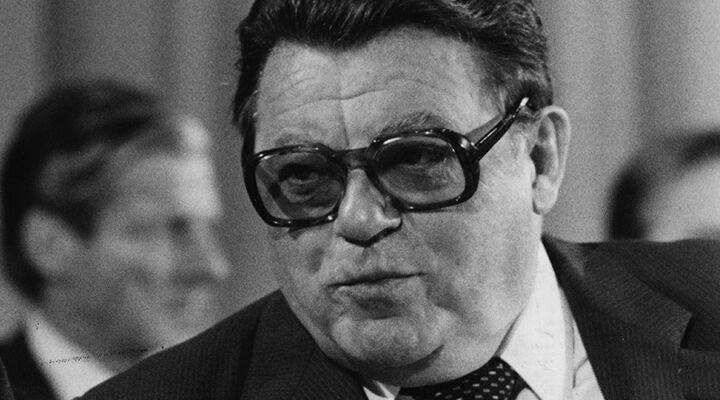
Germans Groan for a Man Like Strauss
Germany is in its biggest crisis since World War ii: Alarming terrorist attacks have occurred in neighboring countries, hundreds of thousands of refugees are streaming into Europe, its own population is being radicalized, Russia is rising in the east, and an indecisive chancellor holds the reins. Is it surprising that Germans are groaning for a strong leader?
“The times are bad,” political adviser Gertrud Höhler told Frau im Spiegel. “Voters don’t want politicians who are cowards, but those who speak ‘plaintext’” (Trumpet translation throughout).
Franz Josef Strauss was such a leader. He helped establish the Christian Social Union (csu) in 1945. In the 1950s and 1960s, he served in the governing cabinet as defense minister, then as finance minister. In 1978, he became state premier of Bavaria, holding the office until his death in 1988. Strauss, who served when Germany was divided, had a strong desire to defend the rights of his people: His main goal was a united Germany. This often led him to strongly criticize the governing body.
Major newspapers, as well as politicians, see the void caused by his death and are looking for someone to fill it. German newspaper Die Zeit interviewed Franz Josef Strauss’s son, asking him what he thinks about the current government. Max Strauss’s answer reflects the thinking of many Germans today. Referring to Chancellor Angela Merkel, he said:
She gives in too often when it gets difficult. This is the case in all major issues: in the financial crisis with the euro, in the nuclear issue, even with the refugees. She wobbles around. And now her Europe is springing apart. As a politician, Angela Merkel is pretty much the opposite of my father.
For many years, Merkel has been Germany’s “chancellor-without-doubt.” But times are changing and people are looking for a man like Strauss—someone radically different from Merkel. Yet there is no Strauss equivalent in today’s government. Apparently, that’s one reason Germans are giving their votes to the Alternative for Germany (AfD) today.
Founded in 2013, AfD strongly opposed the government decisions in the eurozone crisis. During the refugee crisis, its right-wing views turned even more radical, and the AfD now strongly opposes the chancellor. More Germans are siding with this radical view, leading to the party’s victories in the spring elections, giving it a place in parliament for all three states.
Interestingly, a Forsa survey commissioned by Der Stern and RTL showed that AfD leader Frauke Petry received only 47 out of a 100 trust points from her own AfD supporters; whereas the same supporters rated Horst Seehofer, the leader of the csu (who also opposes the chancellor), with 69 points. A survey among voters of all parties awards Petry with only 19 trust points. People don’t really trust the AfD, but they don’t see an alternative—the csu is only present in Bavaria. Nonetheless, the spring elections showed that the Germans groan for change.
Seehofer is attempting to fill the shoes of Franz Josef Strauss. The media criticize him for his seemingly contradictory stance: He strongly opposes Merkel’s decisions, but still cooperates with her. Most recently, he threatened to prove before court that Merkel acted unconstitutionally, but he never followed through.
It is in this climate of political uncertainty that former Bavarian State Premier Edmund Stoiber, a man who worked alongside Strauss, is receiving more and more attention because of his “plaintext.” He speaks about the politically incorrect topics people care about.
This is why many major newspapers and tv hosts have invited him for interviews. They ask him: How would you solve the problem? His answers point back to Strauss. Strauss would have never permitted a democratically legalized party to be at the right of the conservative csu. This, Stoiber explained in a recent Spiegel interview, means he would have addressed the concerns of the people—exactly what Merkel is failing to do. In that situation there would have been no need for an AfD. Yet Stoiber, after he was asked if there was an alternative to Merkel’s policies, concluded, saying: “You notice I’m an older man ….”
Whom can Germans look to, then, for strong leadership? Strauss died many years ago, Seehofer doesn’t act upon his words, and Stoiber gets older with each passing year. The answer goes back to what political adviser Gertrud Höhler remarked: a man who can explain the world in “plaintext” and listen to the people’s needs. Karl-Theodor zu Guttenberg, the political grandson of Strauss and Germany’s former defense minister, is such a man.
According to one new Forsa poll, a majority of 48 percent of respondents would welcome Guttenberg’s return (14 percent were undecided). Höhler explains why Guttenberg’s popularity is rising:
The high approval rating in the polls shows that he [had] found favor with the people in Germany and they did not hold the affair of his written-off doctoral thesis against him permanently. The times are bad, and voters don’t want politicians who are cowards, but those who speak plaintext.
She went on to explain that Guttenberg has a financial backing (with his estate) and, unlike others, is free to say what he wants.
As the crises in Germany become worse, more people will call for a man like Strauss. Watch Guttenberg to be pushed back into German politics. For more on this subject, read editor in chief Gerald Flurry’s article “Has Germany’s Strongman Finally Arrived?”
